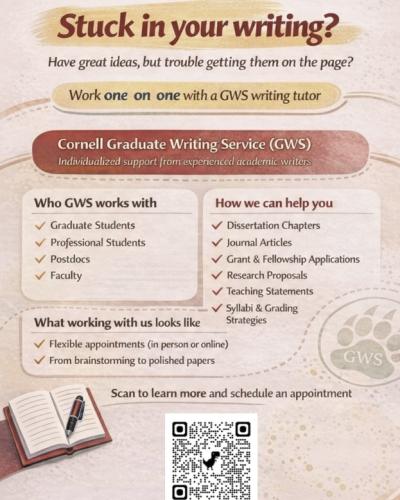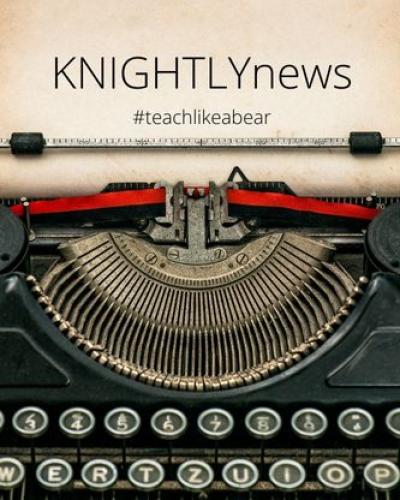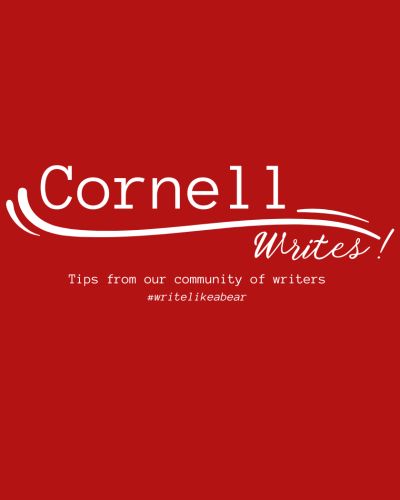Cornell Writes! Tips from our community of writers is a digital newsletter sponsored by the Knight Institute for Writing in the Disciplines and the Cornell University Graduate School.
Each week, a member of our writing community – a Graduate Writing Service, English Language Support Office, or Cornell Writing Centers tutor; a writing specialist from the Knight Institute; a writing instructor from our First-Year Writing Seminars or Writing in the Majors programs; maybe YOU – will share a writing strategy from their own writer’s toolkit. #writelikeabear
Contact Tracy Hamler Carrick with questions and ideas.
Meet Kate Navickas
Hello Cornell Writers! My name is Kate Navickas. I teach writing and direct the Cornell Writing Centers. And, I am always writing something–example analysis paragraphs to use with students in class, writing center social media posts or promotional website articles, and even the occasional journal article or conference paper.
Here is this week’s Writing Tip!
When I teach research writing, students often explain their projects as being about “X.” They may be researching pesticides in farming, online learning during Covid, or the war in Ukraine, among other relevant and interesting options. One of the first things I encourage them to do is to turn these topics into a question. This may feel like a simplistic game of reframing, but developing a focus question when you’re writing does a lot.
Questions can be used throughout the writing process:
A good question can help you select and evaluate evidence. Sometimes we choose quotes to support our work because they feel powerful or definitional; however, our evidence needs to directly relate to our focus and help us do things as writers–we need to use quotes that allow us to say more, analyze with greater depth, and connect our analysis to the larger significance of the topic. Evidence should answer our question in interesting and complicated ways (not simple yes or no).
Questions lead to deeper analysis. When analyzing a quote or piece of evidence it can be hard to know where to start. Typically, the answer is to start by simply explaining the quote… but then how do we say more than that? One way is to hold the quote up to our focus question and see what it tells us–how does this particular perspective answer this question? Sometimes, too, it helps to shift the question a little bit. Instead of asking “What is the relationship between X and Y?,” for deeper analysis I might shift that question to “Why is this relationship uneven?” or “Why does this perspective offer a more effective option?”
Questions can help you evaluate your draft more holistically. After having drafted a piece of writing, it can be hard to know how to revise. One way to critically review your own writing is to have a focus question as a guide for rereading through each paragraph or section. In other words, as you reread your draft, you will ask: how does this paragraph or section answer my question? The goal is to understand how paragraphs work across a piece to build a particular argument. This activity may also help you notice gaps in information or perspectives, diversions, or things that don’t necessarily fit.
But, don’t feel like you can’t revise and rework your question as your research, thinking, and argument evolve! Questions give us direction, but they also need to be flexible and evolve as our projects do.





